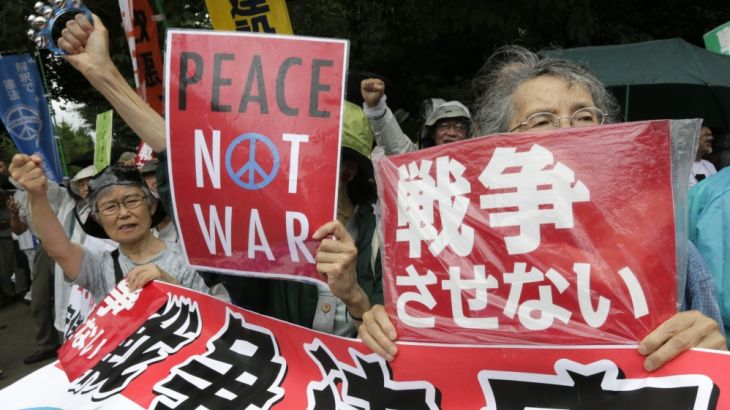
Is Japan’s military heading for a fight?
Protesters fear plans to expand the role of the military undermines Japan’s pacifist constitution.
It’s something that has defined Japan for almost 70 years: A pacifist constitution, drawn up by the United States after Japan’s defeat in World War II.
It states: “The Japanese people forever renounce war as a sovereign right of the nation and the threat or use of force as means of settling international disputes.”
Keep reading
list of 4 itemsRussia’s Putin eyes greater support from China for Ukraine war effort
India-Iran port deal: A gateway to Central Asia or a geostrategic headache?
India’s income inequality widens, should wealth be redistributed?
It goes on to say: “Land, sea, and air forces, as well as other war potential, will never be maintained.”
But Prime Minister Shinzo Abe has been pressing to expand the role of the military, in the face of what he has called “increasing security challenges” in the region – a guarded reference to China.
Japan’s lower house of parliament has now pushed through a contentious bill, dropping a ban on collective self-defence.
It means Japan’s Self-Defense Forces would be allowed to come to the aid of an ally, and that could see Japanese troops fighting overseas.
It is estimated that up to 80 percent of the population is against the changes, fearing Japan could be dragged into foreign conflicts.
So does the new bill represent a fundamental change to Japan’s pacifist stance?
Or is it a necessary measure to keep the country safe?
Presenter: Adrian Finighan
Guests:
Tomohiko Taniguchi – Special adviser to the Cabinet of Prime Minister Shinzo Abe.
Michael Penn – President of Shingetsu News Agency, and author of the book ‘Japan and the War on Terror’.
Yanmei Xie – Senior analyst for Northeast Asia at the International Crisis Group.
Alessio Patalano – Senior lecturer at King’s College London, who focuses on Japanese defence policy and strategy.